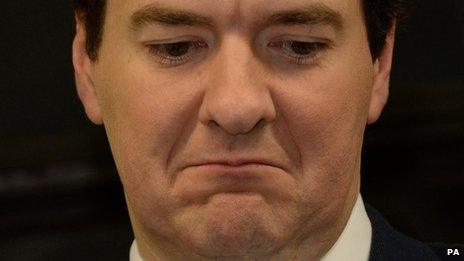Autumn Statement: The politics 'made simple'
- Published

Government "glass half-full" view: The economic plan is working but the job's not done yet.
Opposition "glass half-empty" view: Chancellor's in denial. People will be worse off in 2015 than they were in 2010.
Or, if you prefer things a little more detailed…
This was a first for George Osborne and a welcome one. The first economic statement he's made since becoming chancellor where the economic forecasts have been revised up instead of down.
The economy has defied expectations in recent months and significantly so. The news of higher growth, higher employment and lower borrowing were just what he needed to claim that his policies are working.
There was one other much more negative number produced by the Office for Budget Responsibility (OBR) which was, perhaps counter-intuitively, also helpful for the case the chancellor wanted to make. The OBR said all that extra growth had not cut the size of the budgetary black hole the government needs to fill.
Costs
In the jargon, the structural deficit has not got any smaller. That allows him to say the job is not done yet, growth alone will not do it so more of the same is what the country needs.
The Autumn Statement reflected the tension within government about how far to respond to that living standards agenda and how far to stick to the plan.
We learnt how expensive crowd-pleasing conference promises can be. Free school meals will cost three quarters of a billion pounds, not the £600m Nick Clegg originally spoke of.
Marriage tax breaks will cost just half a billion - a figure that will rise over time.
Taking those unpopular energy levies off bills will cost £440m.
All this is money that many ministers would love to be able to spend in departments which are, once again, being asked to find cuts. Imagine what they could do with £22bn - that, the chancellor revealed, is the cumulative cost of the ever-popular cancellation of planned rises at petrol pumps.
'In denial'
Less eye-catching measures - such as cuts to National Insurance for firms employing those under 21 and business rates for shops and pubs, plans to increase the number of apprenticeships and remove the cap on student numbers - look more like policies designed to address the warnings from the OBR that Britain's improved growth is, so far, based on consumer spending and a housing boom rather than improved productivity or higher exports.
In response to all this, Labour's Ed Balls pointed out that the new improved forecasts were still significantly worse than the ones issued when the coalition came to power - the economy was smaller, while the deficit and debt were higher.
The shadow chancellor's most politically charged point was, though, that the government was "in denial" about the fact that living standards were falling and most people still looked certain to be worse-off at the next election than they had been at the time of the last one.
That "in denial" claim brought howls of protests from Tory MPs, who instinctively dislike Ed Balls but also believe that heckling him loudly will make him shout to be heard, go red in the face and, thus, not look like a chancellor-in-waiting.
In the House of Commons there is no doubt this was George Osborne's day. Of course, though, what will count in the end is not how comfortable the chancellor looks or sounds.
The test will be whether these forecasts prove any better than the ones that were wrong in the past and whether voters believe that the chancellor's plan really is working - for them.